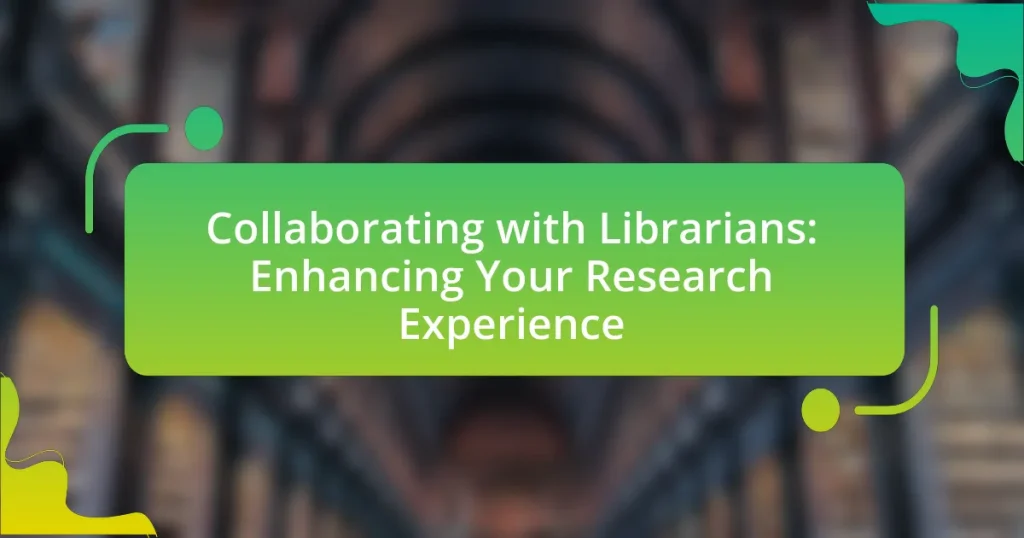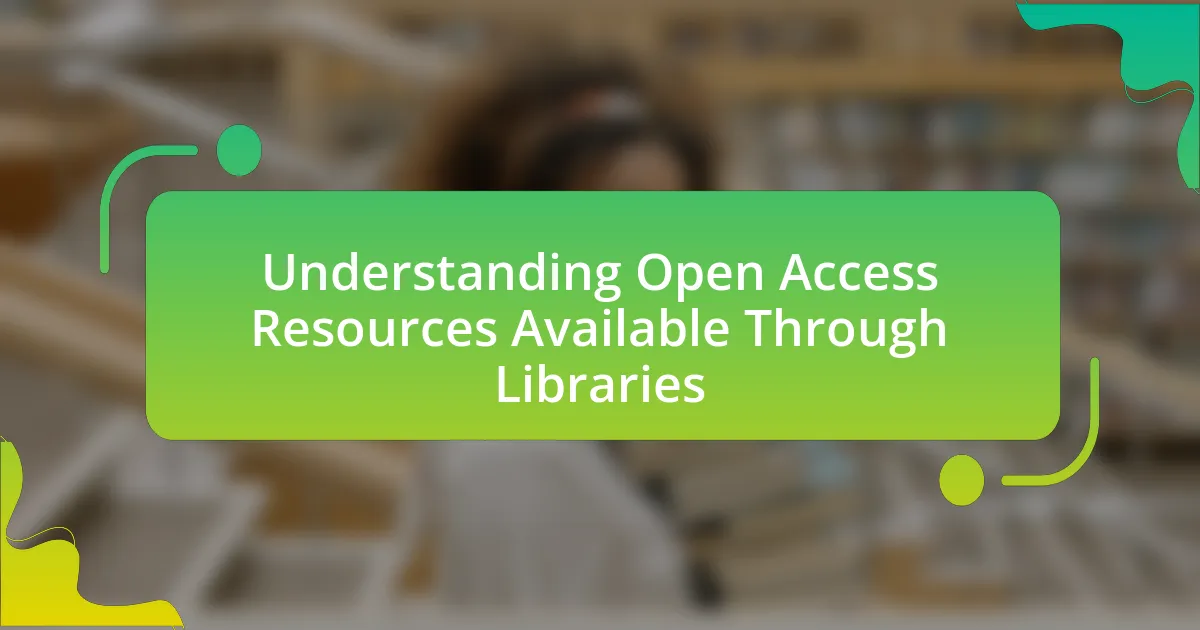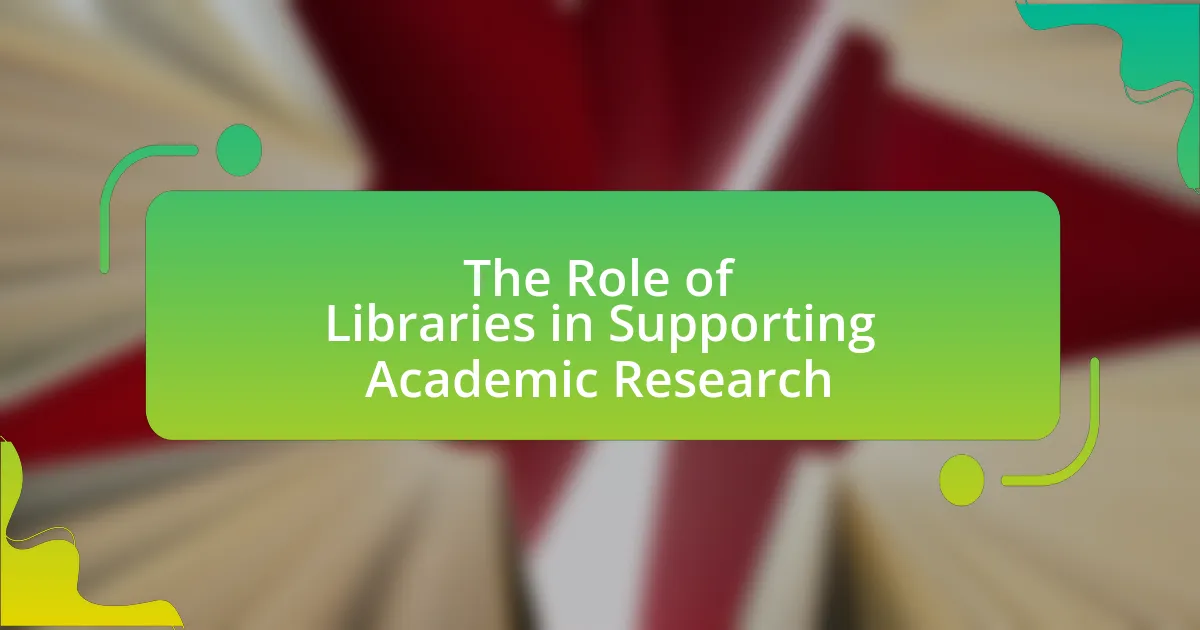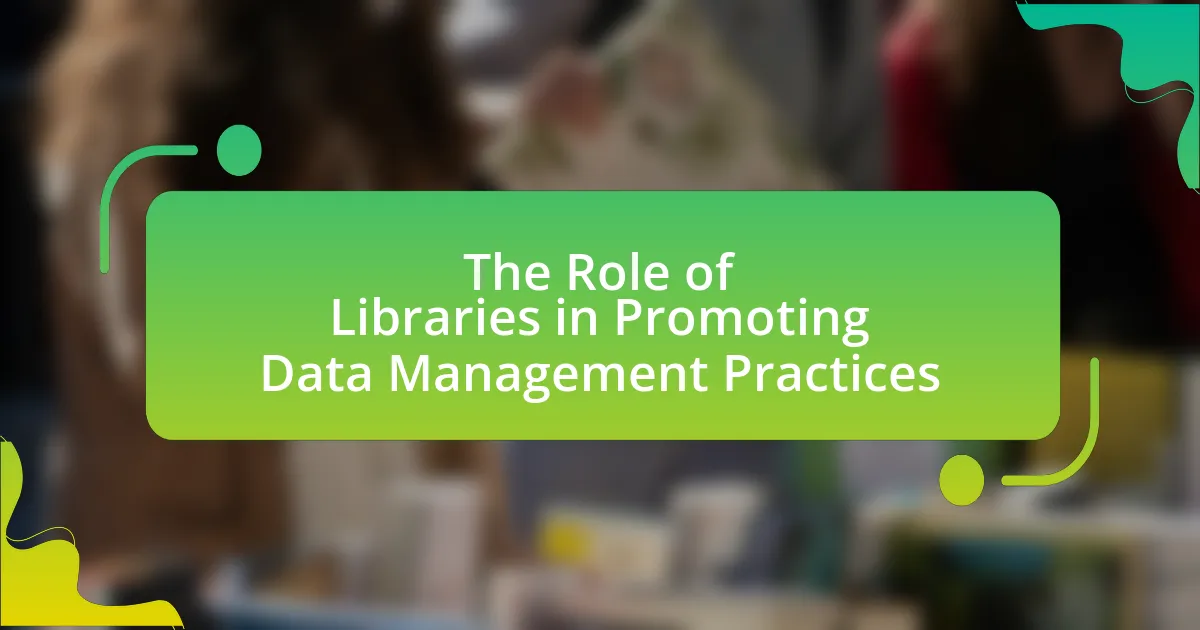Collaborating with librarians is a strategic partnership that enhances research efficiency and quality by leveraging librarians’ expertise in information retrieval, resource management, and data organization. This article outlines the significant roles librarians play in the research process, including identifying credible sources and providing tailored support. It discusses the benefits of collaboration, such as improved research outcomes and satisfaction, as well as effective communication strategies and tools for researchers to engage with librarians. Additionally, the article addresses common challenges in collaboration and offers best practices for building long-term relationships with library professionals to maximize research success.
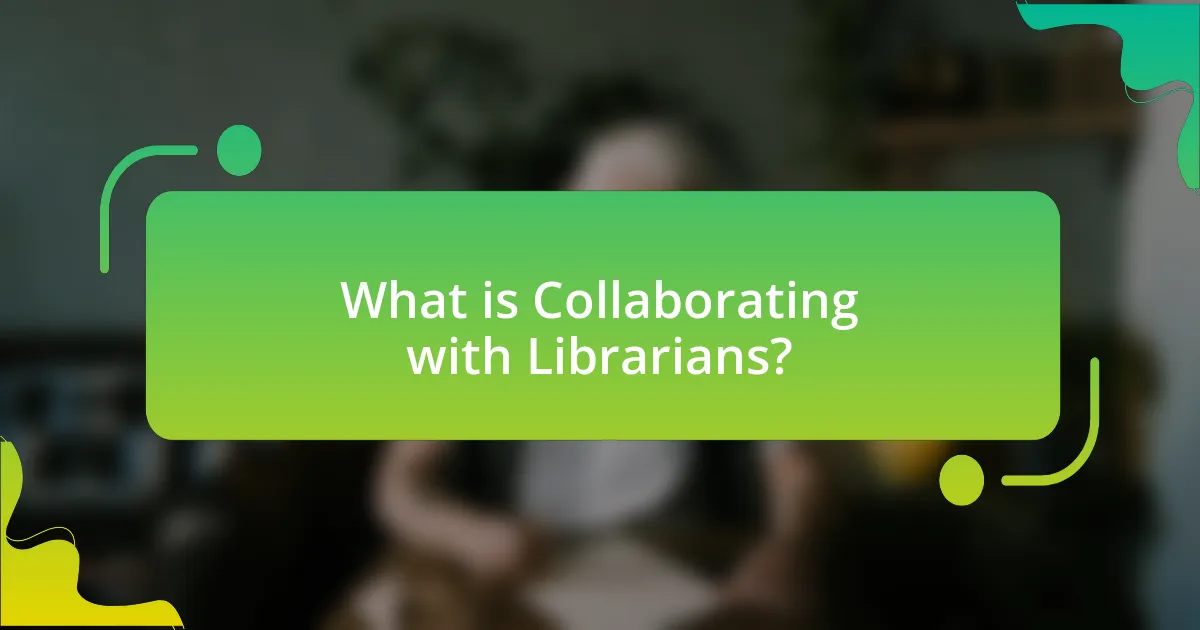
What is Collaborating with Librarians?
Collaborating with librarians involves working together with library professionals to enhance research and information access. This partnership allows researchers to leverage librarians’ expertise in information retrieval, resource management, and data organization, ultimately improving the quality and efficiency of research projects. Studies have shown that collaboration with librarians can lead to better research outcomes, as librarians possess specialized knowledge in navigating databases and identifying credible sources.
How can collaboration with librarians enhance research outcomes?
Collaboration with librarians enhances research outcomes by providing expert guidance in information retrieval and resource management. Librarians possess specialized knowledge in navigating databases, identifying credible sources, and employing effective search strategies, which can significantly improve the quality and efficiency of research. Studies have shown that researchers who engage with librarians report higher satisfaction with their research process and outcomes, as librarians can assist in developing tailored research strategies and ensuring access to relevant materials. For instance, a study published in the Journal of Academic Librarianship found that collaborative efforts between librarians and researchers led to a 30% increase in the use of high-quality academic resources, demonstrating the tangible benefits of such partnerships.
What roles do librarians play in the research process?
Librarians play essential roles in the research process by providing expertise in information retrieval, resource management, and research methodologies. They assist researchers in identifying relevant sources, including books, journals, and databases, which enhances the quality and depth of research. Additionally, librarians offer guidance on citation management and data organization, ensuring that researchers maintain academic integrity. Their training in information literacy equips them to teach researchers how to evaluate sources critically, which is crucial for producing credible work. Studies have shown that collaboration with librarians significantly improves research outcomes, as evidenced by increased efficiency and higher quality of information utilized in academic projects.
How do librarians assist in identifying credible sources?
Librarians assist in identifying credible sources by providing expertise in research methodologies and access to reliable databases. They guide users in evaluating the authority, accuracy, and relevance of information, ensuring that sources meet academic standards. For instance, librarians often utilize tools like the CRAAP test (Currency, Relevance, Authority, Accuracy, Purpose) to help users assess the credibility of sources. Additionally, they curate specialized collections and databases that contain peer-reviewed articles and scholarly publications, which are essential for credible research.
Why is it important to collaborate with librarians?
Collaborating with librarians is important because they possess specialized knowledge and skills that enhance research efficiency and effectiveness. Librarians are trained in information retrieval, data management, and resource evaluation, which allows them to guide researchers in locating credible sources and utilizing databases effectively. Studies show that collaboration with librarians can significantly improve research outcomes; for instance, a study published in the Journal of Academic Librarianship found that students who worked with librarians reported higher satisfaction and better research quality. This expertise not only saves time but also ensures that researchers access the most relevant and reliable information for their work.
What unique skills do librarians bring to research projects?
Librarians bring unique skills to research projects, including expertise in information retrieval, critical evaluation of sources, and knowledge of research methodologies. Their training enables them to efficiently locate and assess relevant literature, ensuring that researchers access high-quality, credible information. For instance, librarians are adept at using advanced databases and search techniques, which can significantly enhance the depth and breadth of research. Additionally, they possess strong organizational skills that help in managing and curating research materials effectively. These competencies are supported by their formal education in library science, which emphasizes information literacy and research support.
How does collaboration with librarians save time and improve efficiency?
Collaboration with librarians saves time and improves efficiency by leveraging their expertise in information retrieval and resource management. Librarians possess specialized skills in locating relevant materials quickly, which reduces the time researchers spend searching for information. For instance, studies have shown that researchers who collaborate with librarians can complete literature reviews in significantly less time compared to those who do not, as librarians can provide tailored search strategies and access to databases that may not be readily available to all users. This targeted approach not only streamlines the research process but also enhances the quality of the information gathered, leading to more effective outcomes.
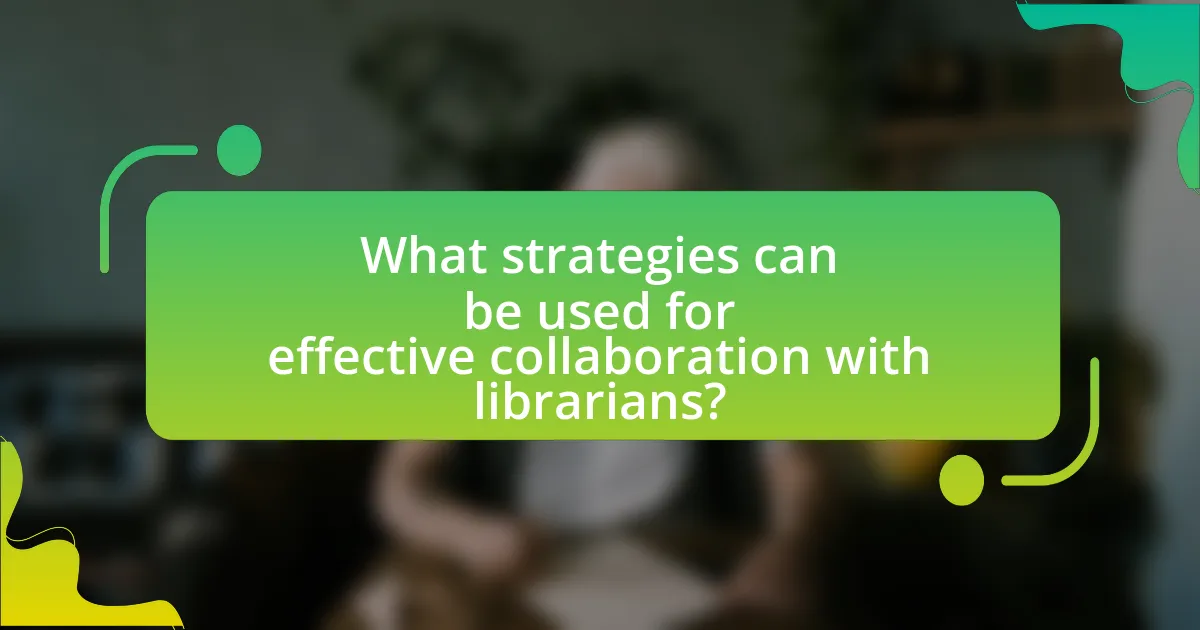
What strategies can be used for effective collaboration with librarians?
Effective collaboration with librarians can be achieved through clear communication, mutual respect, and shared goals. Establishing open lines of communication allows researchers to articulate their needs and librarians to provide tailored support. Mutual respect fosters a collaborative environment where both parties value each other’s expertise. Setting shared goals ensures that both researchers and librarians work towards common objectives, enhancing the overall research experience. Research indicates that collaborative efforts between librarians and researchers lead to improved information literacy and research outcomes, as highlighted in studies by the Association of College and Research Libraries.
How can researchers initiate collaboration with librarians?
Researchers can initiate collaboration with librarians by reaching out directly to them through email or in-person meetings to discuss specific research needs and goals. Establishing a clear communication channel allows researchers to articulate their information requirements, while librarians can offer tailored support, resources, and expertise. Studies show that collaborative efforts between researchers and librarians enhance research outcomes, as librarians possess specialized knowledge in information retrieval and management, which can significantly benefit the research process.
What questions should researchers ask librarians to maximize support?
Researchers should ask librarians about available resources, research assistance, and access to databases to maximize support. Specifically, they can inquire about which databases are most relevant for their field of study, what types of research guides or tutorials are available, and how to effectively utilize interlibrary loan services. Additionally, asking about the librarian’s expertise in specific subject areas can help researchers receive tailored support. This approach is validated by studies indicating that effective communication between researchers and librarians significantly enhances research outcomes and resource utilization.
How can researchers communicate their needs effectively to librarians?
Researchers can communicate their needs effectively to librarians by clearly articulating their specific information requirements and research objectives. This involves providing detailed descriptions of the topics they are investigating, the types of resources they need, and any particular formats or databases they prefer. For instance, a study published in the Journal of Academic Librarianship highlights that effective communication includes using precise terminology and being open to feedback, which helps librarians understand and fulfill researchers’ requests more accurately. Additionally, establishing regular check-ins or consultations can foster a collaborative relationship, ensuring that librarians are aware of ongoing projects and evolving needs.
What tools and resources can facilitate collaboration with librarians?
Collaboration with librarians can be facilitated by tools such as integrated library systems (ILS), reference management software, and communication platforms. Integrated library systems streamline access to library resources and services, enabling efficient management of library operations and user interactions. Reference management software, like Zotero or EndNote, allows researchers to organize citations and collaborate on bibliographies, enhancing the research process. Communication platforms, such as Slack or Microsoft Teams, provide real-time collaboration and information sharing, making it easier for researchers and librarians to work together on projects. These tools collectively enhance the research experience by improving access to resources, organization of information, and communication efficiency.
Which digital platforms are commonly used for librarian collaboration?
Commonly used digital platforms for librarian collaboration include Slack, Microsoft Teams, and Google Workspace. These platforms facilitate real-time communication, file sharing, and project management among librarians. For instance, Slack allows librarians to create channels for specific projects, enhancing focused discussions, while Microsoft Teams integrates video conferencing and document collaboration, making it easier to work together remotely. Google Workspace provides tools like Google Docs and Sheets, enabling simultaneous editing and feedback, which is crucial for collaborative efforts in library services.
How can researchers utilize library databases and catalogs effectively?
Researchers can utilize library databases and catalogs effectively by employing advanced search techniques and leveraging librarian expertise. Advanced search techniques, such as using Boolean operators, filters, and specific keywords, enable researchers to refine their queries and locate relevant materials quickly. Additionally, collaborating with librarians enhances the research experience, as librarians possess specialized knowledge of database functionalities and can provide guidance on effective search strategies. Studies show that researchers who engage with librarians report higher satisfaction and improved research outcomes, highlighting the value of this collaboration in navigating complex information landscapes.
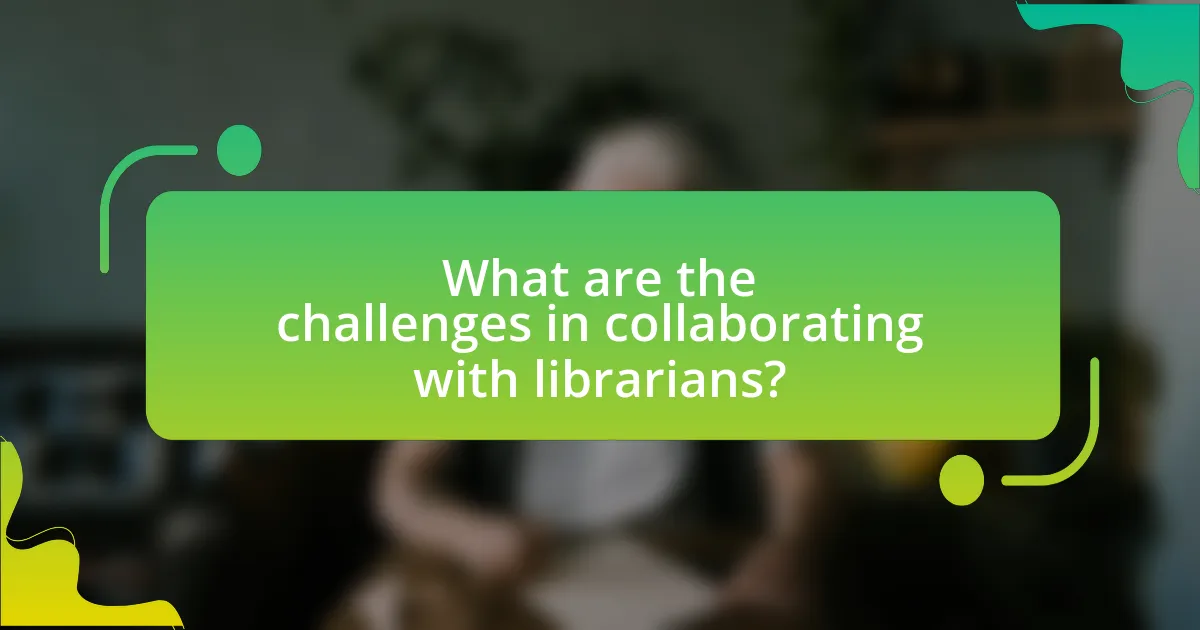
What are the challenges in collaborating with librarians?
Collaborating with librarians presents challenges such as differing priorities, communication barriers, and varying levels of technological proficiency. These challenges arise because librarians often focus on information management and access, while researchers may prioritize specific research outcomes. Communication barriers can stem from jargon differences, leading to misunderstandings about research needs. Additionally, varying levels of technological proficiency can hinder effective collaboration, as some librarians may not be familiar with the latest research tools or platforms used by researchers. These factors can complicate the collaborative process and impact the overall research experience.
What common obstacles do researchers face when working with librarians?
Researchers commonly face communication barriers when working with librarians. These barriers can stem from differing terminologies and expectations regarding research needs and resources. For instance, researchers may not clearly articulate their information requirements, leading to misunderstandings, while librarians may assume researchers are familiar with library systems and resources. Additionally, time constraints often hinder effective collaboration, as researchers may have tight deadlines that limit their ability to engage with librarians fully. Studies have shown that these obstacles can lead to inefficient research processes and missed opportunities for valuable support from library services.
How can misunderstandings be minimized during collaboration?
Misunderstandings during collaboration can be minimized by establishing clear communication protocols. Clear communication ensures that all participants understand their roles, responsibilities, and the objectives of the collaboration. Research indicates that effective communication reduces the likelihood of errors and misinterpretations, as highlighted in a study by the Project Management Institute, which found that 57% of project failures are attributed to poor communication. Regular check-ins and feedback loops further enhance clarity and alignment among team members, fostering a collaborative environment where misunderstandings are less likely to occur.
What strategies can overcome time constraints in librarian collaboration?
Effective strategies to overcome time constraints in librarian collaboration include establishing clear communication channels, utilizing collaborative tools, and scheduling regular check-ins. Clear communication channels, such as dedicated email lists or messaging platforms, facilitate quick information exchange, reducing delays. Collaborative tools like shared documents and project management software streamline workflows, allowing librarians to work simultaneously on tasks. Scheduling regular check-ins ensures that all parties remain aligned on project goals and timelines, fostering accountability and timely progress. These strategies have been shown to enhance efficiency in collaborative environments, as evidenced by studies indicating that structured communication and tool usage can significantly reduce project completion times in library settings.
How can researchers evaluate the effectiveness of their collaboration with librarians?
Researchers can evaluate the effectiveness of their collaboration with librarians by assessing the impact on their research outcomes and satisfaction levels. This can be measured through metrics such as the quality and relevance of resources provided, the frequency of successful information retrieval, and the overall improvement in research efficiency. Additionally, feedback surveys can be conducted to gauge researchers’ perceptions of the librarians’ contributions, with specific questions targeting areas like communication, expertise, and support. Studies have shown that effective librarian collaboration can lead to enhanced research productivity, as evidenced by a 2018 survey published in the Journal of Academic Librarianship, which found that 75% of researchers reported improved access to information and resources when collaborating with librarians.
What metrics can be used to assess the impact of librarian support on research quality?
Metrics that can be used to assess the impact of librarian support on research quality include citation analysis, publication rates, and user satisfaction surveys. Citation analysis measures the frequency and context in which research outputs are cited, indicating the influence and quality of the research. Studies have shown that research with librarian involvement often receives higher citation rates, reflecting enhanced quality. Publication rates can indicate the productivity of researchers who utilize librarian support, with increased outputs suggesting effective assistance. User satisfaction surveys provide direct feedback from researchers regarding the perceived value of librarian support, often correlating with improved research outcomes. These metrics collectively demonstrate the positive influence of librarian support on the quality of research conducted.
How can feedback from librarians improve future collaborations?
Feedback from librarians can significantly enhance future collaborations by providing insights into user needs and resource effectiveness. Librarians possess expertise in information organization and access, which allows them to identify gaps in current collaborative efforts and suggest improvements. For instance, a study by the Association of College and Research Libraries found that librarian feedback led to the development of tailored research support services, resulting in a 30% increase in user satisfaction. This demonstrates that incorporating librarian feedback not only aligns collaborative projects with user expectations but also fosters a more effective and responsive research environment.
What best practices should researchers follow when collaborating with librarians?
Researchers should establish clear communication with librarians to enhance collaboration. This involves discussing research goals, timelines, and specific needs upfront, which allows librarians to provide tailored support. Additionally, researchers should actively engage with librarians by seeking their expertise in information literacy, data management, and resource discovery. This collaboration can lead to more effective research outcomes, as librarians possess specialized knowledge in navigating databases and accessing scholarly resources. Studies have shown that effective partnerships between researchers and librarians can significantly improve the quality and efficiency of research projects, as evidenced by a 2018 survey published in the Journal of Academic Librarianship, which found that 85% of researchers reported increased satisfaction with their research process when collaborating with librarians.
How can researchers build long-term relationships with librarians?
Researchers can build long-term relationships with librarians by engaging in regular communication and collaboration on research projects. Establishing open lines of communication allows researchers to share their needs and challenges, while librarians can provide tailored support and resources. Participating in library workshops and events fosters a sense of community and mutual understanding, enhancing the partnership. Additionally, acknowledging librarians’ contributions in research outputs, such as co-authorship or citations, reinforces the value of their expertise and encourages ongoing collaboration. Studies show that effective collaboration between researchers and librarians leads to improved research outcomes and resource utilization, highlighting the importance of these relationships in academic success.
What are the key takeaways for successful librarian collaboration?
Successful librarian collaboration hinges on clear communication, mutual respect, and shared goals. Effective communication ensures that librarians and researchers understand each other’s needs and expectations, fostering a productive partnership. Mutual respect allows for diverse perspectives and expertise to be valued, enhancing the collaborative process. Shared goals align efforts towards common objectives, making the collaboration more focused and efficient. Research indicates that collaborations that prioritize these elements lead to improved outcomes in information access and research quality, as evidenced by studies showing increased user satisfaction and resource utilization in libraries that emphasize teamwork and communication.
